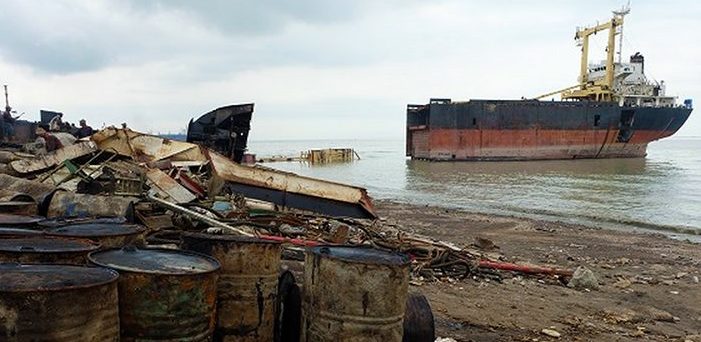No Entry for Pakistan-Flagged Ships in India: What Ship Flags Really Mean and Why They Matter

May 6, 2025 — In a significant move following last month’s terrorist attack in Pahalgam, India has barred the entry of ships bearing the Pakistani flag from all Indian ports. The Directorate General of Shipping (DGS) issued an order on May 3, invoking Section 411 of the Merchant Shipping Act, 1958, to enforce the ban. In response, Pakistan reciprocated by prohibiting Indian-flagged ships from docking at its ports.
This diplomatic standoff has drawn attention to a lesser-known but vital aspect of global maritime operations — the flags that ships fly. Far from being mere symbols of national pride, flags play a crucial legal and administrative role in international shipping. But what do these flags truly signify, and why might a vessel fly the flag of a country thousands of miles from its home port?
What Do Ship Flags Signify?
In international shipping, a ship’s flag indicates the country under whose laws the vessel is registered, known as the flag state. This does not necessarily mean that the ship’s owner, operator, or crew is from that country. Rather, the flag serves as a legal marker, identifying the set of regulations under which the ship must operate and to which it is accountable.
According to the International Maritime Organisation (IMO), linking a ship to a state through registration gives that state the right to protect the ship under international law. It also imposes responsibilities on the state to ensure that the ship complies with international safety, labour, and environmental regulations.
Ships spend most of their time outside territorial waters, sailing through international waters that do not fall under the jurisdiction of any single nation. In such a legal vacuum, the flag becomes an essential tool of governance, ensuring that there is at least one authority responsible for the conduct of the ship and the welfare of its crew.
Legal Framework Behind Ship Flagging
The 1982 United Nations Convention on the Law of the Sea (UNCLOS) sets the global legal foundation for maritime activity. It requires that there be a “genuine link” between a ship and the country whose flag it flies. However, what constitutes a “genuine link” is not precisely defined in the treaty.
Legal scholars and institutions have tried to interpret the term. A 2000 study from Cardiff University suggested that this link could mean the effective exercise of jurisdiction and control by the flag state, such as ensuring that ships are properly surveyed, certified, and crewed. Yet, the ambiguity in the language leaves room for varied interpretations and, occasionally, misuse.
Some nations only allow ships with substantial ties to their economy or personnel to register under their flag, known as “closed registries.” Others operate “open registries,” which permit foreign-owned or foreign-crewed vessels to register easily, regardless of actual connections. This has led to the phenomenon known as the “flag of convenience.”
Flags of Convenience: Legal Loophole or Business Advantage?
A flag of convenience allows shipowners to register their vessels in countries that offer regulatory, financial, or operational advantages. These can include lower registration fees, lenient labour laws, favourable tax regimes, and more relaxed environmental or safety standards.
As a result, the global maritime industry has increasingly concentrated ship registrations in a handful of flag states. According to The Diplomat (2023), the top eight flag states for merchant ships were Panama, Liberia, the Marshall Islands, Hong Kong, Singapore, China, Malta, and the Bahamas. These nations attract the bulk of the world’s merchant fleet, despite their limited maritime infrastructure or small domestic shipping industries.
For instance, Panama — a tiny country with fewer than four million people — is home to the largest shipping registry in the world. The appeal lies in the efficiency of the registration process, minimal regulation, and strong legal protections for shipowners.
While this system allows for cost-efficient global trade, it is not without criticism. Some maritime experts argue that open registries can be exploited for illegal or unsafe operations. In 2017, the Democratic Republic of the Congo (DRC) reported that at least 73 vessels were fraudulently using its flag to conduct illegal fishing in its waters, highlighting how loose oversight can lead to abuses.
Why the Ban on Pakistan-Flagged Ships Matters
India’s decision to ban Pakistani-flagged ships is largely symbolic in nature but has real-world consequences. While there may be limited direct shipping traffic between the two nations, the move serves as a message of political intent and a tool of diplomatic pressure. It also illustrates how ship flagging — usually a bureaucratic and commercial process — can become a weapon in geopolitical disputes.
By invoking the Merchant Shipping Act, 1958, India emphasises its sovereign right to regulate access to its ports. The Act not only governs Indian-flagged ships globally but also sets the rules for foreign-flagged ships operating in Indian territorial waters. By banning ships under Pakistan’s flag, India is asserting that such vessels no longer meet its standards for entry, regardless of ownership or cargo.
regardless of ownership or cargo.
This ban could also affect international shipping companies that register under multiple flags for strategic reasons. A vessel that might have little to no operational connection to Pakistan but is flagged there for convenience will now be excluded from Indian ports. This may prompt companies to reconsider their registration choices based on evolving political risks.
Flags on ships are much more than decorative symbols fluttering in the sea breeze. They are legal identifiers that determine a vessel’s rights, responsibilities, and the laws it must obey. While the practice of flagging under “convenient” jurisdictions has helped streamline global commerce, it also opens up new avenues for geopolitical manoeuvring, as seen in the tit-for-tat maritime bans between India and Pakistan.
As international tensions influence even the highly interconnected world of maritime trade, the flags that ships fly may come under increasing scrutiny, not just for what they represent on paper, but for what they signify in an increasingly polarised global order.
Author: shipping inbox
shipping and maritime related web portal








